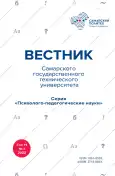Организация учебной дисциплины «Педагогическая риторика» в вузе
- Авторы: Проценко Е.Г.1
-
Учреждения:
- Севастопольский государственный университет
- Выпуск: Том 19, № 3 (2022)
- Страницы: 129-140
- Раздел: Педагогика высшей школы
- URL: https://journal-vniispk.ru/1991-8569/article/view/107409
- DOI: https://doi.org/10.17673/vsgtu-pps.2022.3.9
- ID: 107409
Цитировать
Полный текст
Аннотация
В статье рассматривается содержание и специфика дисциплины «Педагогическая риторика», которая является обязательной в подготовке будущих учителей. Актуализируется проблема уровня риторического мастерства, связанного с подготовкой в вузе, активной практической деятельностью, а также с самостоятельной работой студентов. Представлен анализ содержательного наполнения речевой подготовки будущего учителя. Цель статьи — теоретическое обоснование педагогических условий, способствующих формированию знаний принципов коммуникации в профессиональной этике учителя, коммуникационных технологий в профессиональном взаимодействии. Теоретическая значимость исследования состоит в том, что его результаты дополняют научные представления о педагогических условиях эффективного формирования у студентов необходимых умений коммуникативного воздействия и взаимодействия с целью формирования успешной коммуникативной личности, способной к продуктивному общению в профессиональной педагогической сфере; обогащают теорию и методику профессионального образования в области формирования ораторского и актерского мастерства будущих педагогов. Теоретико-методологической основой исследования являются личностный, индивидуальный, культурологический, деятельностный, психодраматический подходы. Отражен опыт преподавания дисциплины «Педагогическая риторика» в Севастопольском государственном университете. Представлены особенности организации занятий, выполнения практических заданий студентами, разнообразие использованных форм, методов и средств обучения. В работе подчеркивается важность создания условий для творческой деятельности будущих педагогов.
Полный текст
Открыть статью на сайте журналаОб авторах
Елена Геннадьевна Проценко
Севастопольский государственный университет
Автор, ответственный за переписку.
Email: kardamne@mail.ru
ORCID iD: 0000-0002-5834-475X
кандидат педагогических наук, доцент кафедры «Педагогическое образование»
Россия, СевастопольСписок литературы
- Астафьева И.А. Педагогическая риторика: интерпретации содержания дисциплины и практика преподавания // Вестник Омского государственного педагогического университета. Гуманитарные исследования. – 2015. – №4 (8). – С. 29–33. URL: https://cyberleninka.ru/article/n/pedagogicheskaya-ritorika-interpretatsii-soderzhaniya-distsipliny-i-praktika-prepodavaniya (дата обращения: 05.05.2022).
- Денисенко С.И. Педагогическая риторика: проблемы, пути решения // Вестник Московского государственного лингвистического университета. Образование и педагогические науки. – 2020. – № 3 (836). – С. 51–63. URL: https://cyberleninka.ru/article/n/pedagogicheskaya-ritorika-problemy-puti-resheniya (дата обращения: 11.04.2022).
- Федеральный закон от 29.12.2012 №273-ФЗ (ред. от 30.12.2021) «Об образовании в Российской Федерации» (с изм. и доп., вступ. в силу с 01.03.2022).
- Абрамовских Н.В. Реализация системно-деятельностного подхода в процессе профессиональной подготовки будущих педагогов в вузе // Научно-методический электронный журнал «Концепт». – 2017. – № 2. – S10. – С. 6–3. URL: http://e-koncept.ru/2017/470122.htm (дата обращения: 11.05.2022).
- Роджерс К.Р. Становление личности. Взгляд на психотерапию. – М.: ЭКСМО-Пресс, 2001.
- Сериков В.В. Развитие личности в образовательном процессе. – И.: Логос, 2012.
- Педагогическая риторика: учебник для студентов учреждений высш. проф. образования / под ред. Н.Д. Десяевой. – М.: Издат. центр «Академия», 2012. – 256 с.
- Тумина Л. Преподавание риторики в педагогическом вузе // Высшее образование в России. – 2000. – № 6. – С. 69–78.
- Булатова О.С. Педагогический артистизм: учеб. пособие для студ. высш. пед. учеб. заведений. – М.: AcademiA, 2001. – 239 с.
- Михеева Е.Г. Формирование педагогического артистизма студента – будущего учителя в процессе обучения в педагогическом университете: автореф. дис. ... кандидата педагогических наук : 13.00.01. – Самара, 2008. – 26 с.
- Катекина А.А. Технологии театральной педагогики в формировании поликультурной иноязычной коммуникативной компетенции специалиста // КПЖ. – 2015. – № 6-1(113). – С. 102–105. URL: https://cyberleninka.ru/article/n/tehnologii-teatralnoy-pedagogiki-v-formirovanii-polikulturnoy-inoyazychnoy-kommunikativnoy-kompetentsii-spetsialista.
- Кашина Е.Г. Коммуникативно-театральный метод обучения иностранному языку: развитие множественных типов интеллекта у студентов: монография. – Самара: Издательство «Самарский университет», 2012. – 144 с.
- Юрченко О.А. Исследование эффективности социально-психологического тренинга драматической импровизации: дис. … кандидата психологических наук: 19.00.05. – Самара, 1999. – 167 с.
- Якиманская И.С. Основы личностно ориентированного образования. – М.: Лаборатория знаний, 2015. – 220 с.
- Никитина Н.Н., Железнякова О.М., Петухов М.А. Основы профессионально-педагогической деятельности: учебное пособие. – М.: Академия, 2009.
- Шевченко М.С. Профессиональная подготовка студентов-филологов педагогического вуза: методологические подходы // Гуманитарно-педагогическое образование. – 2018. – Т. 4. – № 3. – С. 150–160.
- Шевченко Н.Н. Деятельностный подход к профессиональной подготовке будущего учителя в образовательном процессе университета // Проблемы современного образования. – 2021. – № 5. – C. 116–128. doi: 10.31862/2218-8711-2021-5-116-128
- Grice P. Logic and Conversation // Syntax and Semantics. Speech Acts / P. Cole, J.L. Morgan (eds.). – New Yоrk, 1975. – P. 41–58.
- Кашина Е.Г. Становление творческой личности учителя иностранного языка средствами театральных технологий: автореф. дис. … доктора педагогических наук: 13.00.08. – Самара, 2004. – 39 с.
- Psychodrama Since Moreno: Innovations in Theory and Practice. London: Routledge, 1994.
Дополнительные файлы







